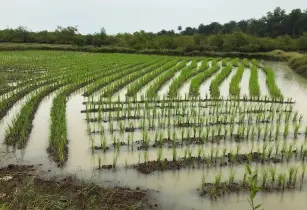A programme to reduce Guineas reliance on rice imports has been officially launched with the support of the Lives and Livelihoods Fund (LLF) – a multilateral development initiative created by the Islamic Development Bank (IsDB) and development cooperation partners
The Bank and the Ministry of Agriculture and Livestock in Guinea marked the nation becoming another member country of the Islamic Development Bank in West Africa to kick off the Regional Rice Value Chain Project (RRVCP) with a working summit that brought together key stakeholders to set out the roadmap for the project in Guinea.
Guinea is among the first cohort of LLF-supported West African countries to benefit from the Regional Rice Value Chain Development Program. The other countries are The Gambia, Niger, Senegal and Sierra Leone. The Guinea rice value chain project, funded to the tune of US$28.3mn in concessional financing by the Lives and Livelihoods Fund (LLF), and resources of the Islamic Solidarity Fund for Development, and the Arab Bank for Economic Development in Africa (BADEA), aims to reduce the high level of rice imports in Guinea by 10% and to strengthen economic growth by improving production and productivity, processing, marketing, and enhancing private sector participation.
Dr Samoii Béavogui, general secretary of the Ministry of Agriculture and Livestock in Guinea said, “Improving domestic rice production is a priority for Guinea. Through initiatives such as the Rice Value Chain Project, we are seeing increasing investment in this area that is improving productivity and also increasing employment opportunities.”
Musa Sillah, director of the Islamic Development Bank’s Regional Hub of Dakar, Senegal added, “By empowering countries across Africa to invest in their own rice sectors, the LLF can help them boost productivity and competitiveness and rely less on imports. This will enable smallholder producers to increase their incomes, improving the lives and livelihoods of hundreds of thousands of people, especially within rural areas.”
The project team will work with actors across the value chain – smallholder farmers, producers associations, agro-processors, traders, millers, service providers, agro-dealers, aggregators, financial institutions, and rural communities – to break free of constraints that hinder rice development. This will include developing key infrastructure including efficient irrigation systems, on-farm drying and storage facilities that minimise post-harvest losses, relevant extension and advisory services, and agro-processing through the effective engagement of the rice millers. Additionally, the project will increase access to yield-enhancing technologies (improved seeds and appropriate fertilisers) that could raise yields to at least 6 tonnes per ha, mechanisation that improves land preparation and harvesting.





